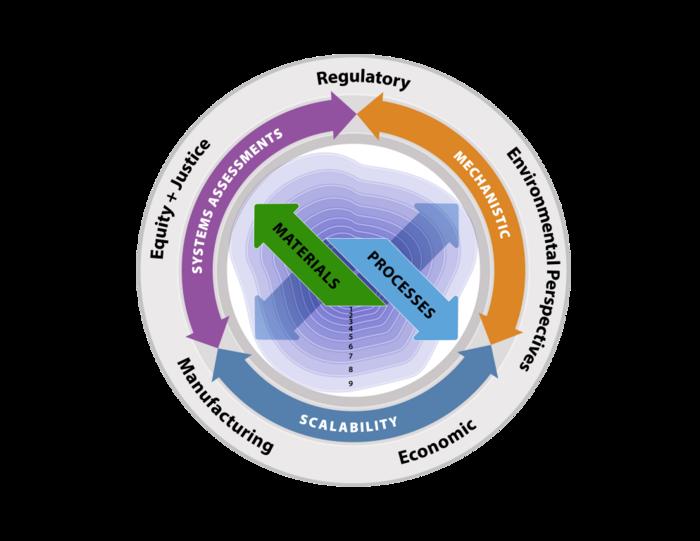Scientists at Oak Ridge National Laboratory and six other Department of Energy national laboratories have developed a United States-based perspective for achieving net-zero carbon emissions. The roadmap was recently published in the journal Nature Reviews Chemistry.

Credit: Andy Sproles/ORNL, U.S. Dept. of Energy
Scientists at Oak Ridge National Laboratory and six other Department of Energy national laboratories have developed a United States-based perspective for achieving net-zero carbon emissions. The roadmap was recently published in the journal Nature Reviews Chemistry.
The researchers from the DOE laboratories — ORNL, Pacific Northwest National Laboratory, Brookhaven National Laboratory, Argonne National Laboratory, Lawrence Berkeley National Laboratory, Ames National Laboratory and SLAC National Accelerator Laboratory — pooled their diverse expertise to devise a roadmap to “defossilize” portions of the U.S. economy by reducing carbon emissions from segments of the market that are challenging to electrify. Their plan calls for using novel approaches to increase the repurposing of carbon that already exists, thereby closing the carbon cycle.
“The breadth of this research shows the benefit of collaboration across our national laboratories,” said ORNL Director Stephen Streiffer. “Carbon is a vital part of many of today’s products and processes, and we must be creative in how to address its use in the face of global climate change.”
Unlike decarbonization, which focuses on capturing or sequestering carbon emissions, defossilization involves slowing or stopping the demand for new fossil-fuel extraction. This could be achieved by recovering carbon from existing processes and products and, instead of setting it aside, reusing it where possible. This “circular economy” would reclaim much of the carbon that already exists in fossil-fueled power generation and difficult-to-use materials such as biomass, municipal waste, biomethane, carbon dioxide and plastics.
Defossilization could specifically help reduce new emissions from the transportation and industrial sectors that, together, account for more than 50% of the country’s carbon footprint. They also are the most difficult segments to transition from fossil fuels to electricity in a process called electrification. While industrial and scientific research continues to discover suitable clean technologies or materials substitutes, these and other vital parts of the economy will continue to require carbon to operate.
Michelle K. Kidder is a distinguished ORNL researcher and program manager for ORNL’s DOE Fossil Energy Carbon Management decarbonization portfolio. Her focus is on integration of novel material development for chemical reactions and separations at atomic-to-industrial process levels for sustainable and renewable clean energy technologies. She said achieving defossilization in difficult-to-electrify segments will require accelerating the pace of discovery for transformative technologies.
“Maintaining today’s 15- to 20-year discover-design-develop-deploy cycle will not allow us to slow, stop or even reverse climate impacts in time to meet aggressive 2030 and 2050 U.S. targets,” she said. “We must instead find new ways to approach fundamental advancements in science and more quickly translate discoveries into applications that can make significant impact on emissions reductions.”
To enable more widespread and affordable, equitable and inclusive defossilization, hundreds of scientists and technical experts from throughout the country’s national laboratory system are working to bridge historical scientific and technology barriers. Research at ORNL is focused on reducing the nation’s carbon footprint without burdening other resources, such as water or precious metals. For example, researchers are combining chemistry, artificial intelligence and machine learning to help predict properties for new materials and using ORNL’s Frontier — the world’s fastest supercomputer — to make high-performance computations as they engineer and model new energy technologies, including next-generation fusion and new fission nuclear reactors. While their research relies on science, it increasingly incorporates techno-economic and lifecycle analyses to help pinpoint potential environmental and social impact challenges of new technologies.
Kidder sees a compelling need to include such systemwide analyses that encompass technical, environmental, economic, political and social factors. “Even as we look for alternatives to reusing and keeping carbon in play, defossilization must allow equitable and ecological solutions for everyone,” she said. “If we can bring this vision to fruition at the urgent pace needed, we also can reduce carbon dioxide and its consequent impact on the environment while ensuring that no community is left behind.”
UT-Battelle manages ORNL for the Department of Energy’s Office of Science, the single largest supporter of basic research in the physical sciences in the United States. The Office of Science is working to address some of the most pressing challenges of our time. For more information, please visit energy.gov/science.
Journal
Nature Reviews Chemistry
Article Title
A US perspective on closing the carbon cycle to defossilize difficult-to-electrify segments of our economy
Article Publication Date
1-May-2024



